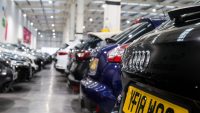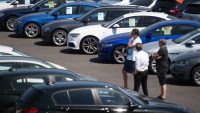The new car market may have suffered a near 40 per cent drop in January, but with showrooms closed and test drives frowned upon, is that any surprise?
The fact dealers managed to achieve that level is impressive in itself and demonstrates a resilient, imaginative and talented industry that has adapted quickly to keep going.
But with restrictions looking increasingly likely to impact March’s new registration plate change what could happen to car sales this year?
I’ve been chatting to plenty of car dealers, manufacturers and industry experts in the last few weeks and while they all admit times are tough right now, there’s an increasingly positive underlying sentiment among them.
There is hope that things will get better rapidly once restrictions are lifted and I am inclined to agree with them.
While these are merely my personal predictions, I’ve thought long and hard about the reasons why I think car dealers have reasons to be cheerful. Ok, I could be accused of looking on the bright side, but I’ll make no excuses for a little dose of optimism.
2020 wasn’t all that bad
Despite car dealerships being closed for three months of the year, tiered restrictions and different rules for the regions, many car dealers are reporting impressive numbers. A heady mix of furlough, business rates holidays, the opportunity to cut costs, rising used car prices, a boom in demand and the death of pre-reg saw many dealers record record years. One group boss told me his 2020 numbers would be ‘historic’. That’s hardly a disaster is it? Expect to see more of that as numbers for last year are released.
Lessons have been learned
Car dealers have adapted quickly. Online sales are rapidly becoming the norm and customers like being able to do much of the car sales process at home. While at the moment they’re forced to do it, when restrictions are lifted and customers are able to do both digital and physical visits, the opportunity for dealers will be vast. Digital sales, facilitated by fewer staff, also keeps costs lower.
Savings are high
While many people have sadly lost their jobs, the numbers have not been quite so great as many experts feared. Those who have remained in work have stashed away more money than ever before with the Bank of England revealing this week consumers have £125bn in their savings accounts. The Bank predicts £6.5bn of that will be spent as we emerge from lockdown – and I can see many using the funds to splash out on a new car.
Consumer debt is low
Discretionary spending is at an all time low as households are only able to purchase essential items as the majority of shops are closed. They can’t go out to eat or drink either, meaning they’re spending the cash they’d otherwise be frittering away by paying off debt instead. Consumer levels of debt have plummeted while record-low interest rates mean there are great deals to be had. An attractive car finance offer could tempt buyers as we emerge from restrictions.
House prices have remained high
One of the main reasons consumer confidence hasn’t dropped too far is because house prices have remained buoyant. The stamp duty holiday has helped fuel the market and while prices dipped an insignificant 0.3 per cent in January, they have enjoyed seven consecutive months of growth. When people’s homes grow in value, they feel wealthier and are more likely to spend out on other things, cars included.
No one is going on holiday
There’s next to no chance the family holiday to Spain or Greece is going to happen this year and for many families that represents a huge saving. If they’re opting for a Staycation instead then they might choose to upgrade the family wheels for something more suitable or reliable. If they’re saving thousands by not going at all, they might choose to use that cash buying a new car instead.
More people ‘need’ a car
Most people have been avoiding public transport and I can’t see that trend changing any time soon. The pandemic has scared people into their own personal spaces and more people have bought a car to get around – at all price points – instead of hopping on a train or bus. As the pandemic eases, social distancing and masks are likely to remain commonplace and so too will the trend for wanting personal transportation.
- We chat about car demand on this week’s Car Dealer Podcast
Revenge buying is a thing
It’s a phrase used by many now and characterises the fact many people are taking ‘revenge’ on the pandemic by cheering themselves up with a new car purchase. Lockdowns have been depressing and for those working at home, getting out and about in the future will be even more important. While they might not be travelling to the office, leisure and recreational journeys will be more important than ever and I can see plenty of people wanting a new car to do that. Plus, a new vehicle makes people feel good – and right now we all need that.
https://twitter.com/MarshallMotorGp/status/1358343274747097091?s=20
Times are changing
Unless you’ve been hiding under a rock, the government has announced the ban of petrol and diesel car sales by 2030. That’s not long. People will be thinking about changing to electric now, and if they’re not they will be very soon. As the choice in the market increases, the chance of them being tempted to change will only increase. Manufacturers are unveiling more exciting electric cars every week – and the temptation to swap to some new tech will just grow stronger.
Dealers will be open again
Car dealers managed to achieve 60 per cent of normal sales in January – which considering no one could see the car before they bought it is remarkable. Imagine what it will be like when car buyers can try before they buy again. Like it or not, many consumers are putting off purchasing because they want to test drive the cars, or at the very least sit in one before buying. Many buyers will be spending this lockdown researching their next car and will be biding their time to buy when dealers open again. Which, hopefully, won’t be long.
What do you think? Am I right or wrong? If you’re a member of the Car Dealer website you can comment on this story below and let me know what you think.


































